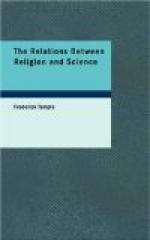favour and absolutely no evidence against it.
And although scientific belief would then still rank
below mathematical belief, it would nevertheless have
a cogency quite irresistible. Science would not
thereby gain in power of progress, in practical acceptance,
or in utility to man. But men are so constituted
that completeness gives a special kind of satisfaction
not to be got in any other way. If Science could
but be complete it would seem to gain in dignity, if
it gained in nothing else. And it is easy to
foster a kind of passion for this completeness until
every attempt to question it is resented. I have
seen a boy first learning mechanics show a dislike
to consider the effect of friction as marring the
symmetry and beauty of mechanical problems; too vague,
too uncertain, too irregular to be allowed any entrance
into a system which is so rounded and so precise without
it. And something of the same temper can sometimes
be seen in students of Science at the very thought
of there being anything in the world not under the
dominion of the great scientific postulate. The
world which thus contains something which Science
cannot deal with is pronounced forthwith to be not
the world that we know, not the world with which we
are concerned; a conceivable world if we choose to
indulge our imagination in such dreams, but not a
real world either now or at any time before or after.
And yet the freedom of the human will and the sense
which cannot be eradicated of the responsibility attaching
to all human conduct, perpetually retorts that this
world in which we live contains an element which cannot
be subdued to obedience to the scientific law, but
will have a course of its own. The sense of responsibility
is a rock which no demand for completeness in Science
can crush. All attempts at reconciling the mechanical
firmness of an unbroken law of uniformity with the
voice within that cannot be silenced telling us that
we must answer for our action, have failed, and we
know that they will for ever fail.
If indeed it could be said that the progress of Science
was really barred by this inability to make the induction
complete, and to assert the unbroken uniformity of
all nature; if it could be said that any uncertainty
was thus cast over scientific conclusions, or any false
or misleading lights thus held up to draw inquirers
from the true path, it would undoubtedly become a
duty to examine, and to examine anxiously, whether
indeed it could be true that our faculties were thus
hopelessly at variance with each other, the scientific
faculty, imposing on us one belief, and the spiritual
faculty another, and the two practically irreconcileable.
But there is no reason whatever for thinking this.
Newton’s investigations were unquestionably pursued,
as all true scientific investigations must ever be
pursued, in reliance on the truth of the uniformity
of nature, and yet he never felt it the slightest
hindrance to his progress that he always tacitly and




